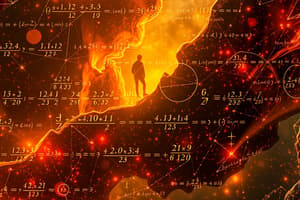Podcast
Questions and Answers
What is the main focus of algebra?
What is the main focus of algebra?
- Working with known quantities
- Solving fixed number equations
- Manipulating symbols (correct)
- Exploring geometric shapes
Which term represents unknown quantities in algebraic expressions?
Which term represents unknown quantities in algebraic expressions?
- Parameters
- Variables (correct)
- Coefficients
- Constants
What makes quadratic equations more challenging compared to linear equations?
What makes quadratic equations more challenging compared to linear equations?
- They involve a squared term. (correct)
- They cannot be graphed.
- They always have irrational solutions.
- They have more variables.
How do variables help in algebra problem-solving?
How do variables help in algebra problem-solving?
What does mastering algebra prepare students for?
What does mastering algebra prepare students for?
What is the formula for finding the area of a rectangle in terms of its width and length?
What is the formula for finding the area of a rectangle in terms of its width and length?
How does algebra contribute to solving real-world problems?
How does algebra contribute to solving real-world problems?
Which type of equations involve terms like x^2 and x as seen in $x^2 - x - 15 = 0$?
Which type of equations involve terms like x^2 and x as seen in $x^2 - x - 15 = 0$?
Why is algebra considered a stepping stone for developing critical reasoning abilities?
Why is algebra considered a stepping stone for developing critical reasoning abilities?
What methods are typically used to solve linear equations?
What methods are typically used to solve linear equations?
How does exploring math through algebra benefit individuals?
How does exploring math through algebra benefit individuals?
Which technique is specifically mentioned as useful for solving quadratic equations?
Which technique is specifically mentioned as useful for solving quadratic equations?
Flashcards are hidden until you start studying
Study Notes
Exploring Math through Algebra
Algebra is an essential branch of mathematics where we focus on solving equations containing variables rather than fixed numbers. In this engaging exploration of math, let's delve into what makes algebra so fascinating and valuable.
Variables and Equations
At its core, algebraic thinking revolves around manipulating symbols like x, (y), and (z) – known as variables – which represent unknown quantities within mathematical expressions called equations. These variables allow us to generalize solutions across multiple problems because they capture commonalities between situations. For example, if you wanted to create a rule for finding the area of all rectangles with any width ((w)) and length ((l)), you could express their relationship using the equation: [Area = w \times l.] This formula holds true regardless of specific values assigned to (w) and (l).
Solving Linear and Quadratic Equations
One type of algebra problem involves solving linear equations such as (2x + 7 = 19) or quadratic equations, like (x^2 - x - 15 = 0). As students progress in their understanding of algebra, they learn methods for isolating and simplifying these equations until they arrive at a final solution for each variable involved.
Solving linear equations usually follows straightforward procedures involving addition, subtraction, multiplication, division, and sometimes moving terms from one side of the equation to another. On the other hand, quadratic equations require more advanced techniques given the squared term present in them, such as completing the square or using the quadratic formula.
Applications of Algebra
The beauty of algebra lies in its versatility; it enables us to solve real-world problems that involve quantifiable relationships among variables. Some applications of algebra include calculating distances traveled by cars, determining loan repayment schedules, balancing chemical reactions, analyzing population trends, designing efficient networks, and predicting future sales based on historical data. By utilizing algebraic formulas and principles, we can make informed decisions and discover patterns hidden beneath complex structures found in nature, society, economics, finance, and science.
Further Study on Abstract Concepts
Going beyond basic arithmetic operations, algebra introduces abstract concepts and powerful tools necessary for higher levels of mathematics. Students who have mastered algebra will find themselves well prepared for studying more advanced subjects, including trigonometry, geometry, precalculus, calculus, statistics, and more. Acquiring a solid foundation in algebra provides a stepping stone towards building sophisticated mathematical skills and critical reasoning abilities.
In conclusion, exploring math through algebra equips individuals with invaluable knowledge and tools that unlock endless possibilities of discovery and innovation across various fields. Learning algebra offers the opportunity to grow intellectually, to cultivate logical thinking, and to lay the groundwork for further studies in mathematics and its applications.
Studying That Suits You
Use AI to generate personalized quizzes and flashcards to suit your learning preferences.




